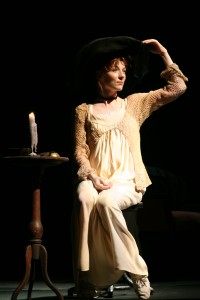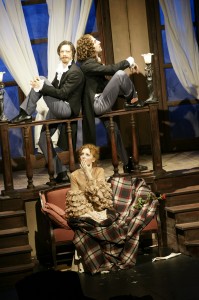Theater Feature: Searching for “Family Happiness”
In this production, director Piotr Fomenko “wanted to explore whether family happiness is even possible, the fight to keep it and the fear of losing it.”
Family Happiness. Adapted from the novella by Leo Tolstoy. Directed by Piotr Fomenko. Staged by the Theatre-Atelier Piotr Fomenko. Presented by Maestro Artist Management and ArtsEmerson at the Cutler Majestic Theatre, Boston, MA, January 26 and 27.
Performances are in Russian with English subtitles.
By Bill Marx

Ksenia Kutepova as Marya Alexandrovna in the Theatre-Atelier Piotr Fomenko production of FAMILY HAPPINESS. Photo: O. Lopach
Written four years before Tolstoy began War and Peace, Family Happiness is another installment in the writer’s colorfully skeptical look at the shifting tides of domestic contentment, an examination of family values, focusing on the battle of the sexes, that would culminate with the memorable sourness of 1889’s The Kreutzer Sonata.
For many critics, Family Happiness‘s tale of a wife’s evolution from innocence to maturity is a minor achievement from the Russian master, but internationally acclaimed director/acting teacher Piotr Fomenko obviously thought otherwise. He adapted it for the stage, among other works of Tolstoy, including War and Peace. Fomenko, who died at the age of 80 in August 2012, became one of the most respected theater artists in Russia, acclaimed for his innovative re-imagings at the classics, ranging from Gogol and Pushkin to Shakespeare and Moliere. Over the course of his career he staged over 60 productions. In 1993, he formed the Theatre-Atelier Piotr Fomenko — the company is coming to Boston with its production of Family Happiness, which premiered in 2000.
Judging by the reviews garnered by Fomenko and his productions Bostonians are in for a treat. According to Moscow Times critic John Freedman, “Fomenko had a way of creating shows that I, along with thousands of others, related to as if they were personal messages, bits of wisdom or insight offered in a hushed whisper and with a wink. I felt as though I breathed more deeply, felt more acutely and heard more sensitively when I attended a Fomenko production. He was a master of exploring human emotions and was quite capable of driving audiences to tears of joy and sadness, although there wasn’t a sentimental bone in his body.”
Via e-mail I sent off a few questions about the artistic approach of the heralded director and the staging of Family Happiness to the company’s lead actress, Ksenia Kutepova.
Arts Fuse: Family Happiness is not considered by many critics to be a major work by Tolstoy. Why did Fomenko want to dramatize this piece?
Ksenia Kutepova: Of course only Pyotr Fomenko would know the answer to this question, but we know that, at some point in his career, he worked on television, directing tele-plays based on Tolstoy’s stories Childhood, Boyhood, Youth and Family Happiness with the great Margarita Terekhova, famous Russian actress, so he has already worked with this material. I think in his head he made a mental note to make it into a theatrical piece. But I also think that something about the subject matter intrigued him, the issue of family happiness and whether it’s possible at all.
AF: How does the late Pyotr Fomenko’s direction of Family Happiness reflect his approach to the theater? The words “nuanced” and “subtle” crop up in most reviews of his work.
Kutepova: Fomenko had several creative periods, and each depended on the works he chose and their authors. His approach to theater was contingent on the script and its author, with whom Fomenko always initiated a dialogue. Nuance and subtlety are Fomenko’s unforgettable signature. In Family Happiness, every tiny detail is important, every musical phrase, rhythm or scene is deliberate and thought through. Fomenko was very meticulous in that sense.
AF: What are the challenges for the actors in performing Family Happiness for Western audiences?
Kutepova: Actually, presenting Family Happiness to a Western audience hasn’t been a challenge, we traveled a lot with the play and had great success all over Europe . It seems that family happiness issues are universally understood, regardless of language . . .
AF: One of Fomenko’s actors has said that the director’s talent was rooted in being able to “clear off a kind of patina from plays.” How does that idea apply to his adaptation of Tolstoy’s Family Happiness?
Kutepova: I think Sergey Puskepalis, whose quote you are referring to, meant plays that have already been staged elsewhere, either in the theater or on television. “To remove patina from a play” in Fomenko’s vision is to take the same material that others have previously used and to make it sound new, to reveal new colors in it. But I don’t think this applies to Family Happiness because it hasn’t been staged anywhere else; Fomenko took Tolstoy’s prose and adapted it into a play.
AF: British writer Virginia Woolf wrote that Family Happiness is about our fear of losing intense happiness. Does this production deal with this idea?
Kutepova: Well, Pyotr Fomeko’s idea was along the same lines as Woolf. He wanted to explore whether family happiness is even possible, the fight to keep it and the fear of losing it. The play digs so deeply into the definition of happiness that no one answer can define it, in my opinion.
AF: Does it make sense to compare this production with the new film version of Anna Karenina, another of Tolstoy’s tales of a dissolving marriage? The movie makes use of a theatrical frame . . .
Kutepova: I’m not sure because I haven’t seen the film yet, but I feel that comparing one Tolstoy adaptation with another is a losing game, although I think we can all agree that Tolstoy explored the question of family and marriage just enough to leave room for further interpretation, whether it’s in film, theater, or another discipline.
Tagged: Arts Emerson, Family Happiness, Leo Tolstoy, Pyotr Fomenko


